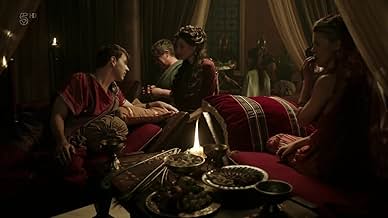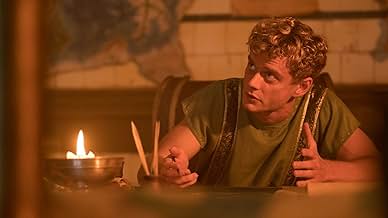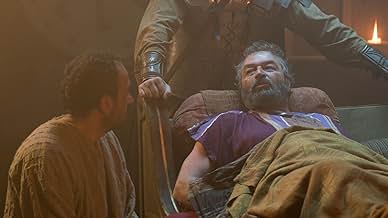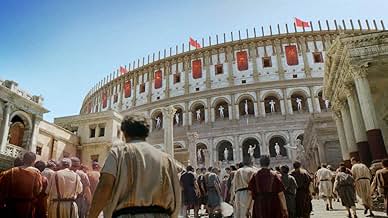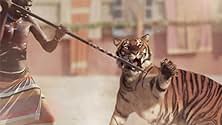Aggiungi una trama nella tua linguaHistorian Bettany Hughes selects eight pivotal days that defined the Roman Empire and its establishment as the world's first superpower.Historian Bettany Hughes selects eight pivotal days that defined the Roman Empire and its establishment as the world's first superpower.Historian Bettany Hughes selects eight pivotal days that defined the Roman Empire and its establishment as the world's first superpower.
Sfoglia gli episodi
Recensioni in evidenza
A fairly superficial coverage of significant events in Roman history.. I don't think I learnt anything new at all, and I thought the dramatisations a bit simplistic, and quite unnecessary. I also though it a mistake to have the presenter dressed so as to emphasise her ample cleavage.
Bring back Mary Beard - she makes the most mundane of Roman things interesting and exciting.
Keeps reminding of how "violent", corrupted and degenerated roman society was, apparently forgetting that you cannot apply today's metric to a civilization of 2k years ago. Why bother mentioning Rome's contribution to civilize Europe, between wn one massacre and the other?
I found the whole series bias against Rome, but the Caesar one irritated me the most. She seems to misunderstand what the Roman Republic was: An oligarchy. The Senators weren't elected, they were pulled from the aristocracy. There was no representation of the people until the Senate was forced to give the plebs representation in the form of tribunes only because they needed the plebs help in a war. And the Senate literally lynched the first couple of tribunes who actually moved to really help the plebeians and heal some of the empires problems. So Caesar was fighting fire with fire only after many many popularii and tribunes were murdered by an aristocratic leader named Sulla. He literally marched an army in and killed every popularii he could which was the first time that was ever done. The show drastically mistakes the Republic and how they viewed common people and even their middle class. She also drastically misrepresents the Germanic and Celtic people of that time. They were brutal and frequently attacked Rome. The Cimbric War is a prime example of German civility. And the Celts invaded constantly and even managed to sack Rome once.
This woman describes Romans as misogynist, following the today's trend. This is false: Rome's women were, in a lot of cases, even more powerful than men.
The plot is clearly made just to catch the audience, sacrificing the truth.
The plot is clearly made just to catch the audience, sacrificing the truth.
Firstly, there is some utterly disgusting comments here from other reviewers regarding the appearance of the presenter- not necessary, .
The series itself is obviously meant to be snapshots of the history around some important days, and these days just so happen to be centred around acts of war and the like, so that's important to keep in mind- very few of these events were without death and bloodshed. There are also lots of arguments that you shouldn't view these events through a modern moralistic lens- but why shouldn't we? Genocidal acts are horrible, no matter when they happened in our historical timeline, it's important to get both sides of this, especially when accounts at the time lament the death and destruction.
It's a nice change from the usual glorification of all things Rome, and I don't think it is biased as other people say, I think that it is balanced. Sure there are more details that could have been mentioned, but with the run time of each segment (~50min or so) there's only so much room there. Hopefully if anyone sees this and wants more info on any of the stories, they will seek it out.
The series itself is obviously meant to be snapshots of the history around some important days, and these days just so happen to be centred around acts of war and the like, so that's important to keep in mind- very few of these events were without death and bloodshed. There are also lots of arguments that you shouldn't view these events through a modern moralistic lens- but why shouldn't we? Genocidal acts are horrible, no matter when they happened in our historical timeline, it's important to get both sides of this, especially when accounts at the time lament the death and destruction.
It's a nice change from the usual glorification of all things Rome, and I don't think it is biased as other people say, I think that it is balanced. Sure there are more details that could have been mentioned, but with the run time of each segment (~50min or so) there's only so much room there. Hopefully if anyone sees this and wants more info on any of the stories, they will seek it out.
I più visti
Accedi per valutare e creare un elenco di titoli salvati per ottenere consigli personalizzati
- How many seasons does Eight Days That Made Rome have?Powered by Alexa
Dettagli
- Data di uscita
- Paese di origine
- Sito ufficiale
- Lingua
- Celebre anche come
- 8 Days That Made Rome
- Luoghi delle riprese
- Azienda produttrice
- Vedi altri crediti dell’azienda su IMDbPro
Contribuisci a questa pagina
Suggerisci una modifica o aggiungi i contenuti mancanti

